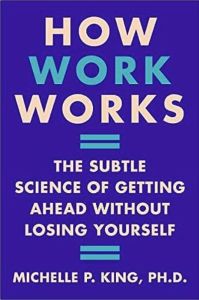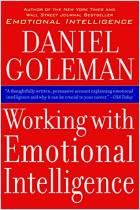Rejoignez getAbstract pour lire le résumé !

Rejoignez getAbstract pour lire le résumé !
Michelle P. King
How Work Works
The Subtle Science of Getting Ahead Without Losing Yourself
HarperBusiness, 2023
Aperçu
To succeed, master the art of “reading the air” – decoding your workplace’s unwritten, informal rules.
Recommendation
Dive deep into the pivotal skill of “reading the air” – gaining a profound understanding of your workplace’s shared norms and unspoken dynamics. Corporate culture expert Michelle P. King, PhD portrays this skill as a prime requirement for advancement and happiness at work since it enables you to navigate cultural shifts and build crucial informal networks. King demystifies the elusive factors that make up a company’s culture, revealing the unwritten rules that govern many workplace interactions. If you can analyze and adapt to the inner workings and values of your firm’s culture – the way power, priorities and relationships ebb and flow – then you can thrive and lead anywhere.
Take-Aways
- Getting ahead in your career requires understanding the subtle nuances of your work environment.
- Increase your sense of belonging by bolstering others’ connectedness.
- Trust is the core of informal relationships that enable success. Do what you can to build trust at work.
- Leverage informal networks to gain valuable advice and support.
- Cultivate awareness of your surroundings to gain informal information.
- Technical knowledge is essential, but career progression also calls for a continuous capacity to learn and adapt on the job.
- To manage your career advancement, define what career success means to you.
- Pay your knowledge forward to create meaningful work.
Summary
Getting ahead in your career requires understanding the subtle nuances of your work environment.
Navigating the ladder of upward mobility can seem like picking through a minefield of secret rules available only to those who already have executive titles. Beyond explicit rules and tasks, any workplace also has informal norms and expectations. These unspoken tenets may include the way colleagues interact and which behaviors earn rewards.
“Over an average lifetime, a person will spend around 90,000 hours at work, which equates to 13 years. To put this in perspective, humans spend just over one year socializing over the average lifetime. Therefore, where and how we work has a huge role to play in our happiness and overall life satisfaction.”
The Japanese have a term for this ability to understand a culture’s context and nuances: “kuuki wo yomu,” or “reading the air.” Particularly when you are new, your happiness at work and your professional success may hinge on your ability to read between the lines and discern how your work environment really works.
Increase your sense of belonging by bolstering others’ connectedness.
To get ahead, ask how you fit in at your workplace. Feeling a sense of belonging and connectedness affects your engagement, morale and productivity. A 2019 Harvard Business Review study found that companies whose employees felt a sense of belonging saw a 56% rise in job performance and a 50% reduction in turnover. Conversely, feeling isolated and excluded can severely damage job performance. If colleagues fail to acknowledge someone when they pass by, that person can suffer a 25% drop in performance on team projects. Remote work can heighten people’s feelings of disconnection.
“There is another side to working life that doesn’t get communicated – the informal rules, which include the norms, expectations and behaviors that govern how things get done.”
Your sense of belonging will build as you develop authentic relationships at work. However, supportive office relationships don’t emerge from playing politics, behaving like everyone else, finding a clique of like-minded individuals or ignoring your need to belong.
You can’t change an exclusionary workplace culture alone because many crucial factors are outside your control, but your behavior matters. When you pursue authentic ties with a variety of people and act with inclusiveness, you can increase your colleagues’ sense of belonging and your own. When you value people for who they are as individuals and recognize that they value you in return, you become part of creating an environment that empowers everyone. As you build your informal networks, reach out to people from various backgrounds at all levels of your company. As studies confirm, people with diverse networks outperform those with less diverse workplace relationships.
Even as firms hire more people from formerly underemployed groups, they risk being less inclusive. This is the “diversity paradox”: People from a variety of groups get hired, but they don’t feel valued or included in a company’s formal or informal networks.
Trust is the core of informal relationships that enable success. Do what you can to build trust at work.
Trust is the foundation of a healthy workplace. In an atmosphere built on trust, people behave consistently. You don’t need to second-guess anyone’s motives, and you’ll understand how people are going to react to various actions and situations. Such a “trust exchange” between you and your co-workers yields tangible rewards, such as pay raises and promotions, and intangible benefits, like approval, support, camaraderie and a sense of belonging.
However, a 2020 Edelman survey found that one-third of employees don’t trust their employers, so cultivating trust in today’s workplace is a deep challenge. To gauge the degree of trust in your workforce, reflect on the behavior you expect from your employees, each person’s access to growth opportunities, and the company’s openness to freedom of expression and disagreement on issues.
“Your ability to do your job relies on the connections you cultivate.”
The rewards of a trusting environment include reduced bureaucracy, heightened creativity, increased collaboration, and healthy informal networks,which often wield more influence than formal structures. While you might excel in official tasks, failing to establish informal relationships by, say, going to dinner with a senior manager, can hinder your career because fewer people will be aware of your excellent work. Informal networks provide critical access to opportunities; in fact, research shows that about 80% of jobs get filled thanks to such networks.
Trust, underpinned by reciprocity, is central to handling change, motivating better performance, building your career and supporting your colleagues’ career development. Navigating and adapting to change at work requires developing informal networks as a source of organizational awareness – a deeper understanding of your company’s dynamics.
Experts anticipate that most workplaces will undergo four transformations in the coming years: a heightened call for technical, social, and emotional skills; an increase in diversity; a continuation of hybrid work with its collaborative challenges; and greater reliance on informal systems rather than hierarchical ones.
Leverage informal networks to gain valuable advice and support.
The most important, influential networking usually happens during simple daily interactions with your colleagues, not at formal networking events. Informal relationships play a significant role in job placement, professional development and future earnings. Employees with close relationships at work are seven times more likely to be happy in their jobs.
“When it comes to working life, what you see is not always what you get. …When you know to read the air, your work is not about the work anymore; it’s about influence.”
Informal connections, developed over time, are crucial for gaining the information, advice and resources you need. Aim to leverage three types of informal workplace networks:
Advice – Your “Informal Advice Networks” include colleagues or friends who can offer guidance, such as helping you understand work challenges, company jargon or how to pitch an idea. Such interactions often occur spontaneously through unscheduled chats or calls. This network is vital when you first join a company and need to gain tacit knowledge to understand the nuances of the environment.
Social – Your “Informal Social Support Networks” include the people you confide in for professional and personal support. These trustworthy associates avoid workplace gossip and can offer both emotional support and practical counsel on work-related matters.
Informational – Your “Informal Informational Networks” help you navigate informal aspects of the workplace, such as potential systemic changes, relationship dynamics and collaboration.
To start building your networks, first, map your current connections to make them visible. Choose the type of network (advice, social support or informational) to map. Then, list the people in that network. Categorize them by demographic similarity, relationship benefits (mutually beneficial or one-way), and the strength of the connection (close or loose). Diversify your network by seeking “super-connecters”: people with extensive networks often extending into the executive suites of several companies. Invest in relationships where you provide connections, growth opportunities and career benefits. Don’t network only with people in your field or company because you never know when an outside connection will be helpful.
Cultivate awareness of your surroundings to gain informal information.
Awareness of your surroundings is crucial for your career. Cultivate several types of awareness to gain the informal information you need for upward mobility.
Self-awareness means understanding your thoughts, feelings, and behaviors and how others perceive them. Recognizing the gap between how you see yourself and how others see you enables you to adjust your behavior. People often risk their connections and their jobs due to behavioral issues they aren’t even aware of; with better self-awareness, they could change to mitigate the damage. To increase your self-awareness take three steps: Reflect on your actions and their implications, genuinely heed feedback and self-assessments, and regulate your behavior.
“When you are unwilling to adjust your approach to manage the impact it has on other people, what you are really saying is you don’t care.”
“Other awareness” refers to your ability to understand and empathize with other people’s thoughts, feelings, and behaviors and to distinguish them from your own. Understanding your colleagues and clients enables better communication and fosters connection and belonging. Engage in “perspective taking” to enhance your awareness of others. Try to see things through their eyes.For example, a man meeting with a client was pleased when the client noticed his nice watch, so he told the client all about it. He never realized, first, that the client had pointed out the watch to hint that the meeting time was over and, second, that he was causing his client to stress about future commitments.
“Organizational awareness” is your knowledge and understanding of how people perceive you at work. This level of awareness helps you prevent misunderstandings, especially in virtual environments where people can jump to conclusions based on limited interactions. For example, a colleague who doesn’t feel well during a virtual meeting may turn off the camera and just listen, though others could misinterpret this as disengagement. Share your self-reflections to build trust and increase everyone’s organizational awareness.
Technical knowledge is essential, but career progression also calls for a continuous capacity to learn and adapt on the job.
In the past, most employees got ahead by gaining entry to a closed network of executives, hoarding valuable organizational information, and currying favor with a boss who could offer a promotion in return. These methods no longer serve in today’s culture of innovation, diversity, and collaboration. Workers today understand that development, growth, and upward mobility are collaborative processes built on diverse perspectives and shared efforts.
Companies no longer expect to hire or promote people with perfect skills or an exact level of experience. Employers now examine a candidate’s potential to learn and grow. The ability to acquire new skills on the job determines an employee’s prospects and career trajectory. When a COO with great technical and operational skills was promoted to CEO, his board explained that he needed to add to his leadership abilities by “learning to be inclusive, democratic, and empathic.” The board’s confidence that he could learn on the job assured his promotion.
“When it comes to informal learning, consider your co-workers your teachers, because they can help you understand whether your behaviors are effective or not.”
To get ahead, you must notice what skills others have acquired to get promoted. Observe what worked for them, collaborate, and request peer feedback. Learn from your mistakes. Gaining informal career development, promotions, or growth opportunities takes time because they all require learning how to read the air around you.
To manage your career advancement, define what career success means to you.
Modern career paths are nonlinear. Career success is now measured in new ways; it requires lifelong learning, creative flexibility, and self-management. While stability and status defined a successful career in the past, today’s solid career is delineated more by individual freedom, growth, work that fits your values, and the ability to make a meaningful contribution than by objective measures like salary. Since you now have the power to define your career success if you understand your own needs and values, start by defining those. Understand why you do the work you do – your purpose, which the Japanese call ikigai.
“Ikigai is the contribution we make – it’s everything we leave behind.”
First, write down the purpose you want to fulfill, such as writing a book that helps people feel seen and heard. Second, consider who can advocate for your career or help you reach your goals, such as a publisher that could sell your book. Sometimes, a mentor or coach can offer the advice or connections you need. Finally, think about how to sell yourself – your reputation or your value to others. People are social. They don’t just buy good products; they buy the person who makes or represents them. They need to trust their choice, so be clear about who you are, and transparent and consistent in your messaging.
Pay your knowledge forward to create meaningful work.
Meaningful work involves more than just doing your tasks; it is tied to the quality of your workplace relationships. Research consistently shows that strong relationships, rather than salary or wealth, are primary predictors of happiness. A 2018 study found that most employees would trade a significant portion of future earnings for a greater sense of purpose at work.
“Your organization isn’t a place, room, or building. Instead, workplaces are a community – much like a forest – composed of people, including you, who are connected by their shared contribution.”
Employees who “pay it forward” by voluntarily supporting their co-workers and their organization enhance their own well-being and their firm’s performance. For example, one dedicated headmistress exceeded her duties to find special reading glasses for a struggling student. Your ability to find meaning at work depends on how you engage, contribute, and manage your needs and values within the organization.
About the Author
Corporate culture expert Michelle Penelope King, PhD, is also the author of The Fix: Overcome the Invisible Barriers That Are Holding Women Back at Work and the host of The Fix podcast. Founder of The Culture Practice consultancy, she is a frequent public speaker whose work has been featured in The Economist, the Harvard Business Review, the Financial Times, and many other publications.
This document is restricted to personal use only.

















Comment on this summary